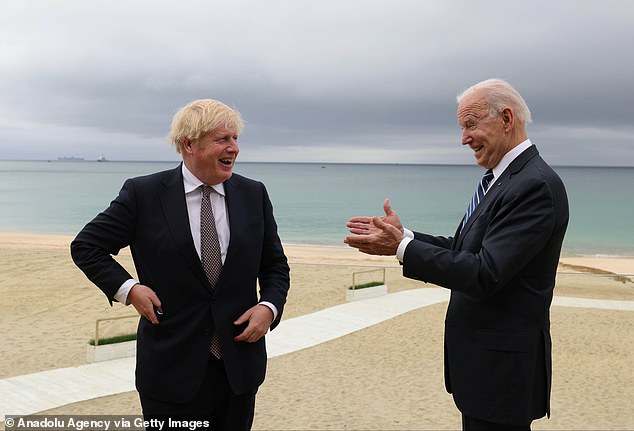
Peter Zeihan: Europe Goes Nuclear
We’ve got two major developments in Eurasia. We’re talking about Ukraine disabling two ships in the Caspian Sea and Poland getting EU approval to build…
Thought Leader: Peter Zeihan

For 20 years — ever since I began to work in the U.S. — I have tended to say that the ‘special relationship’ between the United Kingdom and United States is more special to Britons than to Americans.
If the U.S. has a truly special relationship in its foreign policy, I used to say, it was with Israel, not Britain. Only in the imaginations of a few British prime ministers — Margaret Thatcher and Tony Blair, for example, but not Harold Wilson or Edward Heath — was the relationship with the U.S. truly special.
On the eve of the invasion of Iraq, in March 2003, for instance, I wrote: ‘The costs of backing Bush are immediately obvious: we get to fight a war and perhaps also help with an occupation that is bound to cost at least some blood and treasure, and we become the Islamic zealots’ third-favourite target (don’t forget Israel).
‘The benefits, by contrast, are intangible.’
Not without some foresight, I warned Tony Blair of the huge political risk he ran in affirming, at that fateful juncture, Britain’s role as the primus inter pares of America’s allies.

For 20 years — ever since I began to work in the U.S. — I have tended to say that the ‘special relationship’ between the United Kingdom and United States is more special to Britons than to Americans
Tensions
My view for years has been that Britons are too infatuated with all things American — Hollywood for a century, more recently the apps of Silicon Valley — to notice that U.S. citizens see the UK mainly as London shops, Scottish golf courses, and an odd society of violent, beer-swilling yobs led incompetently by Old Etonian prime ministers and infested by velociraptor journalists.
However, an Echelon Insights/YouGov poll commissioned by the Policy Exchange think tank points to a surprising change in the relationship. Despite the transatlantic tensions of Donald Trump’s presidency and the widespread expectation that the Irish-American Joe Biden would give Old Etonian Boris Johnson short shrift, the ‘special’ relationship seems to have become more special to Americans than to us.
In all, 59 per cent of Americans regard the UK as an important ally, compared with just 43 per cent of Britons who feel the same about the U.S.
Again, 59 per cent of Americans think the U.S. and UK have a special relationship in Winston Churchill’s sense of the term, compared with just 28 per cent of Britons.
What is more, 39 per cent of Britons say the relationship worsened ‘in the past month or so’, compared with 30 per cent of Americans.
What might be going on here? Are we Britons suddenly just not that into them?

In all, 59 per cent of Americans regard the UK as an important ally, compared with just 43 per cent of Britons who feel the same about the U.S
It’s important to note the poll was conducted soon after Afghanistan was abandoned to the Taliban, but just before the announcement of the new AUSUK defence cooperation agreement between Australia, the U.S. and the UK.
In other words, after a major humiliation for all America’s Nato allies and before a major boost to the special relationship that enraged at least one other Nato ally, France.
Not surprisingly, roughly half of Americans and Britons agree that the Kabul debacle hurt the reputation of the U.S. around the world. But Britons feel more resentment — after all, this was a decision made in Washington and foisted on its allies.
My guess would be that if the same poll were conducted today, in the wake of the AUSUK announcement, that gap between U.S. and British views would largely vanish.
Though it is far more strategically important for Australia, AUSUK is also a welcome win for Boris Johnson. It is the first real success for his post-Brexit ‘Global Britain’ strategy, and comes as balm after Biden ignored his plea to delay the Afghanistan withdrawal.
To Johnson’s ageing Conservative base, the effort to give substance to the ‘Anglosphere’ brings back memories of Margaret Thatcher’s version of the ‘special relationship’, when she played Vivien Leigh to Ronald Reagan’s Clark Gable.
For Washington, the deal also provides welcome clarity about what side the UK will choose in what I have been calling Cold War II.

Secret
As recently as January 2020, Johnson approved Huawei equipment for use in the UK’s 5G network. (He later backtracked under pressure from his own MPs.) Just six years ago, Johnson’s predecessor but one, David Cameron, spoke of a ‘golden era’ in UK-China relations. Even Theresa May courted China as a potential post-Brexit trading partner. Those days are gone.
See source to continue reading.
Peter Zeihan: Europe Goes Nuclear
We’ve got two major developments in Eurasia. We’re talking about Ukraine disabling two ships in the Caspian Sea and Poland getting EU approval to build…
Thought Leader: Peter Zeihan
Dr. Sanjay Gupta’s Top Health Stories of 2025
From the resurgence of measles to a new way to treat pain, 2025 was a challenge for public health while still offering moments of hope. Sanjay…
Thought Leader: Sanjay Gupta
Ian Bremmer: The state of global conflict in 2025
On GZERO World, Ian Bremmer takes a hard look at the biggest global crises and conflicts that defined our world in 2025 with CNN’s Clarissa…
Thought Leader: Ian Bremmer

